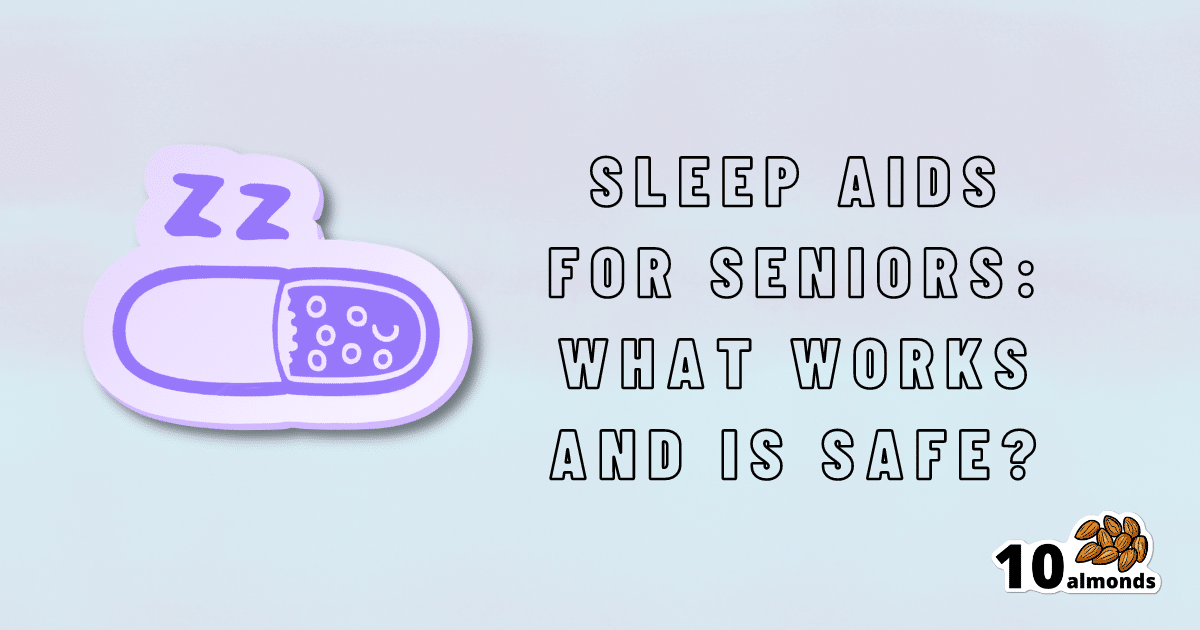Safe Effective Sleep Aids For Seniors
Choosing a safe sleep aid for seniors can be tough. Tranquilizers and non-benzo hypnotics have downsides, but melatonin and herbal options like chamomile are worth a try.

Safe Efective Sleep Aids For Seniors
Choosing a safe, effective sleep aid can be difficult, especially as we get older. Take for example this research review, which practically says, when it comes to drugs, “Nope nope nope nope nope, definitely not, we don’t know, wow no, useful in one (1) circumstance only, definitely not, fine if you must”:
Review of Safety and Efficacy of Sleep Medicines in Older Adults
Let’s break it down…
What’s not so great
Tranquilizers aren’t very healthy ways to get to sleep, and are generally only well-used as a last resort. The most common of these are benzodiazepines, which is the general family of drugs with names usually ending in –azepam and –azolam.
Their downsides are many, but perhaps their biggest is their tendency to induce tolerance, dependence, and addiction.
Non-benzo hypnotics aren’t fabulous either. Z-drugs such as zolpidem tartrate (popularly known by the brand name Ambien, amongst others), comes with warnings that it shouldn’t be prescribed if you have sleep apnea (i.e., one of the most common causes of insomnia), and should be used only with caution in patients who have depression or are elderly, as it may cause protracted daytime sedation and/or ataxia.
See also: Benzodiazepine and z-drug withdrawal
(and here’s a user-friendly US-based resource for benzodiazepine addiction specifically)
Antihistamines are commonly sold as over-the-counter sleep aids, because they can cause drowsiness, but a) they often don’t b) they may reduce your immune response that you may actually need for something. They’re still a lot safer than tranquilizers, though.
What about cannabis products?
We wrote about some of the myths and realities of cannabis use yesterday, but it does have some medical uses beyond pain relief, and use as a sleep aid is one of them—but there’s another caveat.
How it works: CBD, and especially THC, reduces REM sleep, causing you to spend longer in deep sleep. Deep sleep is more restorative and restful. And, if part of your sleep problem was nightmares, they can only occur during REM sleep, so you’ll be skipping those, too. However, REM sleep is also necessary for good brain health, and missing too much of it will result in cognitive impairment.
Opting for a CBD product that doesn’t contain THC may improve sleep with less (in fact, no known) risk of long-term impairment.
See: Cannabis, Cannabinoids, and Sleep: a Review of the Literature
Melatonin: a powerful helper with a good safety profile
We did a main feature on this recently, so we won’t take up too much space here, but suffice it to say: melatonin is our body’s own natural sleep hormone, and our body is good at scrubbing it when we see white/blue light (so, look at such if you feel groggy upon awakening, and it should clear up quickly), so that and its very short elimination half-life again make it quite safe.
Unlike tranquilizers, we don’t develop a tolerance to it, let alone dependence or addiction, and unlike cannabis, it doesn’t produce long-term adverse effects (after all, our brains are supposed to have melatonin in them every night). You can read our previous main feature (including a link to get melatonin, if you want) here:
Melatonin: A Safe Natural Sleep Supplement
Herbal options: which really work?
Valerian? Probably not, but it seems safe to try. Data on this is very inconsistent, and many studies supporting it had poor methodology. Shinjyo et al. also hypothesized that the inconsistency may be due to the highly variable quality of the supplements, and lack of regulation, as they are provided “based on traditional use only”.
Chamomile? Given the fame of chamomile tea as a soothing, relaxing bedtime drink, there’s surprisingly little research out there for this specifically (as opposed to other medicinal features of chamomile, of which there are plenty).
But here’s one study that found it helped significantly:
The effects of chamomile extract on sleep quality among elderly people: A clinical trial
Unlike valerian, which is often sold as tablets, chamomile is most often sold as a herbal preparation for making chamomile tea, so the quality is probably quite consistent. You can also easily grow your own in most places!
Technological interventions
We may not have sci-fi style regeneration alcoves just yet, but white noise machines, or better yet, pink noise machines, help:
White Noise Is Good; Pink Noise Is Better
Note: the noise machine can be a literal physical device purchased to do that (most often sold as for babies, but babies aren’t the only ones who need to sleep!), but it can also just be your phone playing an appropriate audio file (there are apps available) or YouTube video.
We reviewed some sleep apps; you might like those too:
The Head-To-Head Of Google and Apple’s Top Apps For Getting Your Head Down
Enjoy, and rest well!
Share This Post
Learn To Grow
Sign up for weekly gardening tips, product reviews and discounts.




